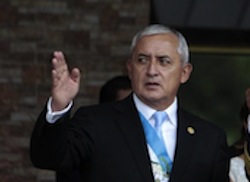Guatemala’s Constitutional Court rejected a petition that would have granted at least a temporary reprieve to President Otto Perez Molina from a congressional corruption probe. The decision raises questions about the uncertain future of political leadership in a country already facing serious security and governance challenges.
The decision released on June 30 officially rejected what is known as an “amparo,” or an injunction, submitted by Perez Molina to stop the congressional investigation, effectively annulling impeachment proceedings that had been brought against him.
Perez Molina and his administration have been dogged for months by high-profle corruption scandals, one involving the country’s Social Security Administration and another involving Guatemala’s customs agency.
Vice President Roxana Baldetti resigned in May after the Supreme Court unanimously ruled that there was enough evidence potentially linking her to corruption allegations to warrant stripping her of immunity and subjecting her to congressional investigation. This latest decision from the court concerning Perez Molina’s immunity exposes him to similar congressional scrutiny.
SEE ALSO: Guatemala News and Profiles
Other countries in the region have also been grappling with similar corruption allegations involving top political leadership. Honduras’ Supreme Court recently issued arrest orders for 16 people suspected in a Honduran Social Security Administration corruption scandal, including Lena Gutierrez, the country’s Vice President of Congress.
InSight Crime Analysis
The Guatemala Court’s ruling is a particularly powerful blow to Perez Molina, highlighting the degree to which political winds have shifted against the president. This all comes on the heels of months of public demonstrations and protests that have been calling for the president’s resignation, galvanizing under the hashtag #RenunciaYa.
SEE ALSO: The War for Guatemala’s Courts
But while this type of ruling against a sitting president suspected of corruption is a victory of sorts in the fight against impunity in the Northern Triangle, it raises serious questions about immediate political leadership in a country facing deep-seated security and organized crime concerns.
Because many of the president’s allies have been arrested or have resigned, including his top security officer, Interior Minister Mauricio Lopez Bonilla, major issues in dire need of attention, such as police reform, grind to a halt and will unlikely proceed whilst Perez Molina fights off these political and legal challenges.
Honduras is going through a similarly turbulent time. The political scandal has ensnared close associates of President Juan Orlando Hernandez and his political party. In the meantime, security strategies, reform processes (also, most notably, in the police), and necessary legislative updates to important security laws are all on hold.

